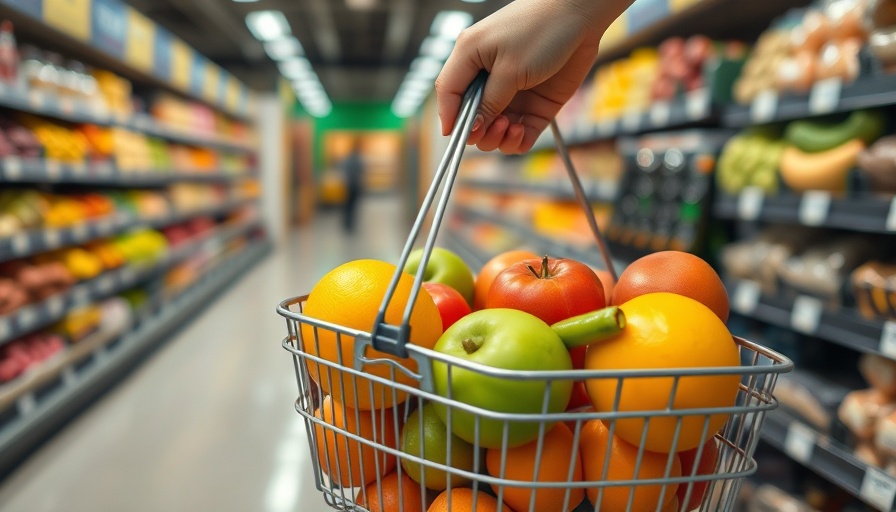
Understanding the Urgency of Food Shortages
The pandemic served as a wake-up call, showcasing how quickly grocery shelves can become barren. Families faced an eerie scenario where food supplies dwindled, leaving many unprepared for such unforeseen disasters. Think of how deeply a natural catastrophe, like floods or wildfires, could impact your food supply. While it's easy to dismiss potential food shortages as a minor concern, the truth is that they can have devastating effects on our daily lives. Imagine a scenario where accessing food becomes incredibly challenging—this is why it's essential to have a proactive plan.
The Importance of Planning Ahead
Historically, communities that have survived pandemics and natural disasters often share one common trait: preparedness. Being proactive can mean the difference between panic and self-sufficiency. Families need to create an emergency food supply long before they encounter an impending disaster. With climate change leading to more frequent droughts, floods, and other calamities, your food preparedness should never be an afterthought but rather an ingrained part of your life.
Taking Stock: Inventory Essentials
Start by taking a thorough inventory of your current food supplies. Open your pantry and assess how long your food will last. If you find yourself with just a week or two of provisions, it’s time to reconsider your strategy. Aim for at least a three-month stockpile of essential items. What’s even more important is to ensure that the foods you choose align with your family’s preferences—there’s no point in storing items that nobody will eat. Utilizing printable tracking sheets can simplify the inventory process and keep you organized, ensuring you always know what’s on hand.
Building Your Food Supply: Step-by-Step
Creating a sustainable food storage plan may initially feel daunting, but it doesn’t have to be. Start small—think about one extra item per grocery shopping trip. Fill your cart with non-perishable foods like grains, canned goods, and healthy snacks that you can enjoy long-term. Not only will this build your stockpile but it will also enhance your self-sufficiency. Here are some key staples to consider: rice, beans, canned vegetables, oats, and pasta. These foods are budget-friendly, versatile, and have long shelf lives.
Practical Tips for Effective Food Storage
Proper food storage extends the life of your provisions and helps maintain quality. Always store food in a cool, dry place; moisture and heat can degrade your supplies. Use airtight containers to protect your stock from pests and spoilage. Additionally, label each item with purchase dates and best-by dates to keep track of freshness. rotating your stock is also a great practice—apply the principle “first in, first out” (FIFO) to manage your supplies effectively.
Embracing Healthy Food Choices for Long-Term Wellbeing
When preparing for potential shortages, it’s also crucial to think about nutritional value. Opting for whole grains, proteins, and a balance of vitamins will ultimately bolster long-term health. Consider investing in seeds for urban gardening; growing your own fruits and vegetables can empower your family with food security and foster a sustainable lifestyle. Gardening isn’t only a means of food production; it is immensely fulfilling and can bring families together.
Local vs. Global Perspectives on Food Security
Food shortages aren't limited to your locality; they are a matter of global concern. Across the world, communities are grappling with the consequences of climate change that disrupt food distribution and agricultural practices. However, by paving the way for local solutions—like supporting urban farms or participating in community gardens—you can contribute to a more resilient food supply system. Local initiatives often bolster accessibility and improve sustainability within the community.
Concluding Insights: Equip Yourself for Future Challenges
Being prepared for a food shortage isn’t just prudent; it’s a proactive way to ensure your family’s well-being amidst uncertainty. By taking inventory, building a robust food supply, and considering local solutions, you embody the spirit of resilience. Embrace the opportunity to enhance your knowledge and capacity for self-sufficiency. Now, more than ever, it’s time to take action!
From tracking your stockpile to venturing into urban gardening, the steps you take now can significantly impact your family’s future. Don't wait for the next crisis—start building your food security today! Your journey into preparedness begins with just a single decision.
 Add Row
Add Row  Add
Add 




 Add Row
Add Row  Add
Add 

Write A Comment